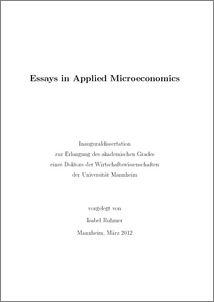|
Essays in applied microeconomics
Ruhmer-Krell, Isabel
![[img]](https://madoc.bib.uni-mannheim.de/31345/1.hassmallThumbnailVersion/Dissertation_Isabel_Ruhmer_final.pdf)  Vorschau |
|
PDF
Dissertation_Isabel_Ruhmer_final.pdf
- Veröffentlichte Version
Download (1MB)
|
|
URL:
|
https://madoc.bib.uni-mannheim.de/31345
|
|
URN:
|
urn:nbn:de:bsz:180-madoc-313458
|
|
Dokumenttyp:
|
Dissertation
|
|
Erscheinungsjahr:
|
2012
|
|
Ort der Veröffentlichung:
|
Mannheim
|
|
Hochschule:
|
Universität Mannheim
|
|
Gutachter:
|
Peitz, Martin
|
|
Datum der mündl. Prüfung:
|
27 März 2012
|
|
Sprache der Veröffentlichung:
|
Englisch
|
|
Einrichtung:
|
Fakultät für Rechtswissenschaft und Volkswirtschaftslehre > Graduiertenkolleg VWL/BWL
|
|
Fachgebiet:
|
330 Wirtschaft
|
|
Normierte Schlagwörter (SWD):
|
Nachfrageinterdependenz , Kartellbildung , Preisabsprache , Patent , Innovationsforschung , Zulieferindustrie , Nutzentheorie , Rational Choice , Kontexteffekt
|
|
Freie Schlagwörter (Englisch):
|
collusion , indirect network effects , two-sided markets , cartel sustainability , 3-player sequential bargaining , upstream R&D , hold-up , patent protection , utility theory , restaurant data , compromise effect , extremeness aversion
|
|
Abstract:
|
This dissertation consists of three self-contained papers, which contribute to different strands of the literature on industrial organization and microeconomic theory.
The first paper analyzes price collusion between platforms in a two-sided market
model. I show that higher indirect network externalities have two opposing effects
on the sustainability of a cartel. First, collusive profits increase while stage game
Nash profits fall - this makes collusion more desirable. Second, the incentive to
deviate increases as demand reacts more sensitively. The latter effect dominates
because of the induced feedback effects and collusion becomes harder to sustain
as indirect network externalities become stronger.
The second paper, which is joint work with Johannes Koenen, examines the impact of patent protection on upstream innovation incentives in a vertical industry with complementary inputs and consecutive investment periods. We show that in case of fixed-order sequential bargaining between suppliers and a downstream firm, ironclad intellectual property rights lead to a complete breakdown of investments into components due to hold-up problems, despite full bargaining power of the investing parties. Knowledge diffusion that allows the downstream firm to buy an older version of the component at a cheaper price in later periods is thus beneficial for all firms. Allowing for a stochastic bargaining sequence alleviates the complete hold-up under patent protection. Yet, upstream innovation might still be higher under knowledge diffusion.
The third paper, which was written jointly with Pia Dovern-Pinger, empirically investigates the existence of the compromise effect, referring to the tendency of individuals to choose an intermediate option in a choice set, using field data from a German Specialties Restaurant. The analysis of demand behavior in response to changes in the menu confirms experimental evidence. While demand generally decreases in prices, individuals tend to avoid alternatives at the lowest or highest end of the price spectrum. In contrast, an expansion of the dish choice set leads customers to choose less extreme options. Finally, group size and other background factors matter, although no clear direction of the effects can be identified.
|
|
Zusätzliche Informationen:
|
Geburtsname: Ruhmer, Isabel
|
 | Dieser Eintrag ist Teil der Universitätsbibliographie. |
 | Das Dokument wird vom Publikationsserver der Universitätsbibliothek Mannheim bereitgestellt. |
 Suche Autoren in Suche Autoren in
Sie haben einen Fehler gefunden? Teilen Sie uns Ihren Korrekturwunsch bitte hier mit: E-Mail
Actions (login required)
 |
Eintrag anzeigen |
|
